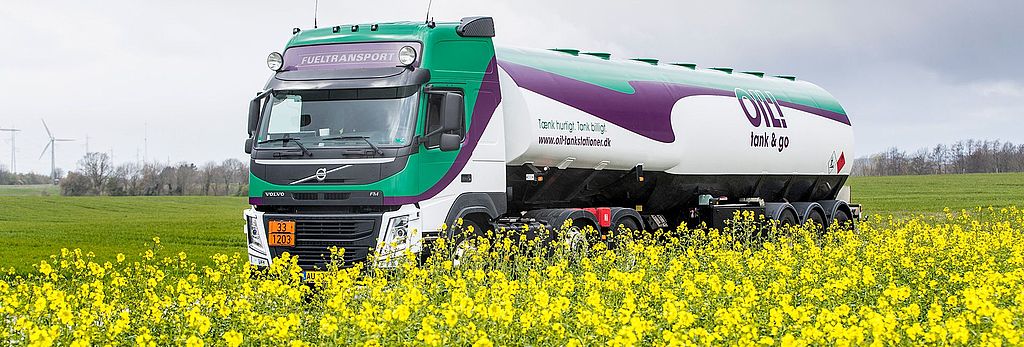
Biofuels to generate motion
What are biofuels?
A biofuel is a liquid, solid or gaseous product used to generate heat, in the heat and electricity generation sectors, or motion in the mobility sector. In this glossary article, we refer to biofuels that are used to generate motion. For a description on biofuels to generate heat and/or electricity, please see separate glossary article.
Biofuels to generate motion (automotive biofuels) are liquid or gaseous fuels for combustion engines, produced from biomass. Source materials can include oil crops, cereals, sugarcane, wood and organic waste. Biofuels are divided into first and second generations, with fuels from algae already being talked about as the third generation.
First-generation fuels - edible oils
In first-generation fuels, only part of the plant is used. They especially include vegetable/edible oils, which can be used unrefined or refined in combustion engines. In Germany, rapeseed (canola) oil is mostly used for this purpose. This biofuel is especially popular in agriculture and in rural areas. Over the past decade the “100 Tractor Program” demonstration project, which converted tractors to run on pure vegetable oil, caused quite a stir.
Biodiesel (FAME)
The use of biodiesel, a fatty acid methyl ester – FAME for short – is more widespread. It is standardized in accordance with DIN EN 14214 and is made from vegetable oils – mostly rapeseed in Germany. Today it is almost exclusively sold mixed with mineral diesel fuel, ever since the German Federal Government set a minimum percentage of biofuels in the Biofuels Quota Act. In accordance with DIN EN 590, up to 7 vol.% can be added to diesel fuel, which is then called B7 fuel. Since 2009, B7 has been the standard fuel for diesel-powered motor vehicles in Germany.
HVO (hydrotreated vegetable oil)
In recent years, hydrotreated vegetable oil (HVO) has also become increasingly important. The source materials for HVO are any oils and fats. Unlike FAME, the biofuel HVO is a hydrocarbon, whose chemical composition is almost identical to that of diesel fuel. The advantages are obvious. It can be added to diesel fuel in any mix ratio as long as it complies with the DIN EN 590 diesel fuel standard. HVO is far superior in terms of durability compared to biodiesel.
Biofuels for aviation fuelling
In addition to use as a blending component in diesel fuel, the first experiences as an aviation fuel have already been gathered. Like biodiesel, its use as a pure fuel makes no sense from a tax perspective in Germany.
Bioethanol
Bioethanol, produced by the alcoholic fermentation and subsequent distillation of starchy plants (especially cereals, sugar beet, sugarcane and corn), is another first-generation fuel. The quality of this biofuel is regulated by DIN EN 15376. Gasoline/petrol that contains ethanol is marketed as E5 and E10, indicating the respective percentage of ethanol. Most vehicles today can use this fuel without any problems. Fuels with a higher ethanol content (E85 or even E100) are also marketed, but they usually require adjustments to the vehicle.
Second-generation fuels - biomethane/bio-CNG
Second-generation fuels, which use whole plant or organic residual and waste materials, include biomethane. Methane is produced in the fermenter of a biogas plant through a biotic reaction in the absence of air. As the raw biogas is only about 60 vol.% methane, it must be processed by separating it from other gases (primarily carbon dioxide, but also hydrogen sulfide). As largely pure methane, from a chemical point of view it is then equal to natural gas and can therefore fuel any natural gas-powered vehicle (cf. Bio-CNG, too).
BtL fuels
The most complex processes are those for obtaining BtL fuels (Biomass to Liquid). Wood is one of the raw materials that can be used. In the first step, biomass is converted to synthesis gas via gasification, which is then liquefied, e.g. by the Fischer-Tropsch process.
Fuels from algae
The same also applies to fuels from algae. From a purely technical perspective, these biofuels pose no problems. In air transport, where the use of renewable energies is otherwise difficult, there have already been successful trials. However, large-scale use is not initially foreseeable for cost reasons.
Liquid fuels such as biofuels are traded by the Mabanaft group, e.g. by Mabanaft Deutschland, Mabanaft Limited, UK, and the Petronord group. Oiltanking Deutschland is active in tank storage logistics.
Biofuels at the Mabanaft business unit Supply, Infrastructure & Trading
Biofuels at the Mabanaft business unit Marketing
Biofuels at Mabanaft Deutschland
Biofuels at Mabanaft Limited, UK
Fuels at Petronord
Tank storage solutions of Oiltanking Deutschland
Status: December 2015
All information subject to change. Errors and omissions excepted.

